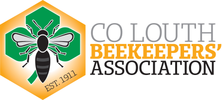Latest News ...
Why you should not import bees and why local bees are best
BIBBA has produced an excellent list of reasons why it's a bad idea to import bees, and why local bees are best suited to your beekeeping.
Since this is a UK organisation, we need to consider another good reason that's specific to Ireland: Ireland is a natural resource of pure Apis mellifera mellifera , the European Dark Bee. You'll hear stories from people that don't know any better, that this bee was wiped out by the Isle of Wight Disease (Acarine) in Ireland, but recent research has proven that it is, in fact, alive and thriving here. The research also indicates that many of the Amm in Ireland have a particularly unique m-DNA marker that indicates that these are pure Irish bees! More recent research shows that even our free-living bees are Amm and they're thriving too.
So don't believe the nay-sayers, keep Dark Bees and prevent this natural resource from being hybridised by non-native versions. Note that Co. Louth is a Voluntary Conservation Area for the native dark bee, so you should never keep anything else here!
Since this is a UK organisation, we need to consider another good reason that's specific to Ireland: Ireland is a natural resource of pure Apis mellifera mellifera , the European Dark Bee. You'll hear stories from people that don't know any better, that this bee was wiped out by the Isle of Wight Disease (Acarine) in Ireland, but recent research has proven that it is, in fact, alive and thriving here. The research also indicates that many of the Amm in Ireland have a particularly unique m-DNA marker that indicates that these are pure Irish bees! More recent research shows that even our free-living bees are Amm and they're thriving too.
So don't believe the nay-sayers, keep Dark Bees and prevent this natural resource from being hybridised by non-native versions. Note that Co. Louth is a Voluntary Conservation Area for the native dark bee, so you should never keep anything else here!
Free online lectures
There are a number of organisations running webinars (online lectures) about all aspects of beekeeping:
- FIBKA are running a series of free online lectures from world-famous bee experts over the next few months. You have to book a ticket in advance since places are limited. However, the lectures will be recorded and will be made available. All lectures start at 7:30 pm. For more details and to book tickets, visit the Eventbrite page. Other FIBKA lectures are available on YouTube in the FIBKA channel.
- BIBBA are running a series of free lectures, including a whole day for beginners, although that one costs a nominal £15.
- There are many others search for "beekeeping" on Eventbrite. Obviously the ones in Ireland & the UK are better for us time-wise - those in the US are often in their evening, at least 5 hours behind us, ideal for Irish night owls.
All-Ireland Pollinator Plan Newsletters
Here Are links to the latest newsletters from the AIPP
Biodiversity Ireland
Biodiversity Ireland is a national centre for the collection, collation, management, analysis and dissemination of data on Ireland’s biological diversity. Biodiversity data are a key requirement for understanding our natural surroundings and for tracking change in our environment. However, they need information on every living thing in Ireland: what they are and where they live. You may be interested in submitting biodiversity information either on-line or via their smart phone app - with the current pandemic situation and the not great weather, this is an ideal way to occupy children and get them interested in their natural surroundings. For the second quarter of this year (1st April-30th June 2020) Biodiversity Ireland received almost 3,000 records from just over 50 different species, from over 590 different people across 32 counties. There's even a league for the most registered species - I'm sure bored kids would love to compete.
The most commonly recorded bumblebees were Bombus pascuorum, B. terrestris and B. lapidarius. The most commonly recorded solitary bees were Andrena cineraria, Halictus rubicundus and Nomada marshamella.
You can also record hares, jellyfish, plants, in fact any species you can think of, so anyone can join in.
The most commonly recorded bumblebees were Bombus pascuorum, B. terrestris and B. lapidarius. The most commonly recorded solitary bees were Andrena cineraria, Halictus rubicundus and Nomada marshamella.
You can also record hares, jellyfish, plants, in fact any species you can think of, so anyone can join in.
Information on Asian Hornet sightings
The UK government have an excellent page on confirmed sightings of Asian Hornets, to keep us up to date with what's happening with these evil creatures.
